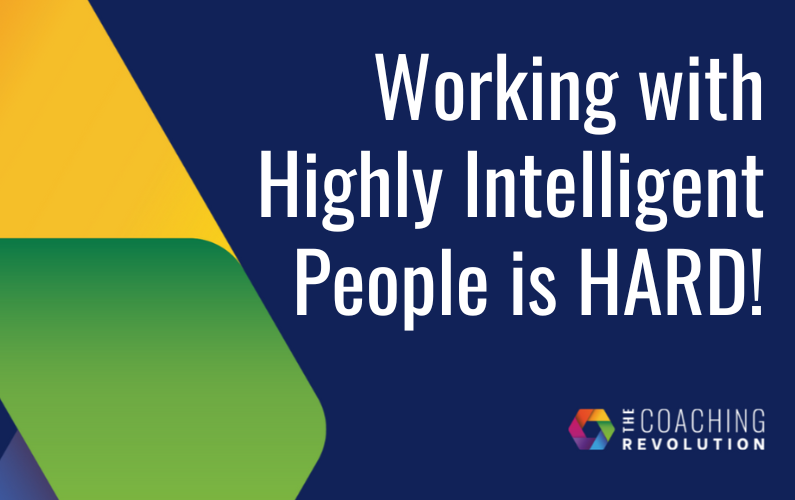Or – Why Intelligence Can Be The Biggest Obstacle!
Coaches are highly intelligent on the whole. I mean, I’ve never met a thick coach.
After years of running The Coaching Revolution, I’ve encountered a peculiar challenge that occurs over and over again. It would be reasonable to assume that highly intelligent individuals would be easier to work with, more receptive to proven marketing strategies, and quicker to implement what we teach. But that assumption is entirely wrong.
Intelligence, particularly when combined with advanced education and professional success, often creates the most stubborn barrier to learning I’ve ever encountered. This isn’t about coaches being difficult deliberately – it’s about how brilliant minds process information that conflicts with their existing frameworks, especially when that information feels counterintuitive.
The fascinating thing is that these coaches don’t question our methodology directly. That would actually be productive and lead to meaningful discussions that I would welcome. Instead, they do something far more problematic – they claim exemption. They’ll listen to our teachings, acknowledge our expertise, then immediately decide in what ways their situation is different, why the normal rules don’t apply to them, and why they, and their potential clients are ‘special cases’ that require different approaches. If I’m lucky, they do this out loud and we can talk about it. If I’m not, they simply fail to thrive.
Difficult Conversations!
I’ve had this conversation with coaches holding PhDs, former executives, medical professionals, and academic researchers. These are people who’ve built careers on rigorous thinking and evidence-based decision making. However, when confronted with marketing principles that feel counterintuitive, they abandon their usual intellectual discipline and retreat into exceptionalism. Man, it’s frustrating!
The core issue becomes crystal clear when I explain that effective marketing means translating what you do into words that potential clients can understand. This requires accepting that people are fundamentally people, regardless of their professional background. What attracts academics, medical professionals, executives, and everyone else is hearing their situation described in language that makes them think “this person understands me.”
But highly intelligent coaches resist this universal truth. They insist their potential clients are somehow different, that standard marketing psychology won’t work in their sophisticated professional circles. One coach argued with me that Tony Robbins doesn’t have a target audience, failing to grasp that Robbins operates from decades of established global brand equity while they’re still building recognition for what they do.
Intelligence and Ego – a Potent Mix
This resistance stems from the uncomfortable collision between intelligence and ego, and I certainly don’t mean to be disparaging when I say this. The reality is that effective marketing often works precisely because it’s counterintuitive, which conflicts with how analytical minds prefer to operate.
What makes this particularly frustrating is watching coaches acknowledge their resistance only after they’ve finally implemented our approach successfully. I’ve lost count of conversations where clients tell me they didn’t understand why they fought so hard against something that clearly works. They often say the penny finally dropped, but they can’t explain their previous resistance, other than to say that it ‘felt wrong’.
The breakthrough usually happens through our community rather than through any direct instruction. When resistant coaches engage with other intelligent professionals who’ve wrestled with identical doubts, the resistance often diminishes. Hearing “I understand how you feel, I felt exactly like that, but this works if you do it the way it’s taught” from a peer carries more weight than any explanation I can provide.
This pattern reveals something uncomfortable about expertise and learning. Traditional expert-to-student knowledge transfer often breaks down when dealing with highly intelligent people who are used to being authorities themselves. They need permission from their peer group more than instruction from teachers. Isn’t that interesting?
The Cost Of Resistance
The cost of this resistance is significant and measurable. Coaches who remain convinced they’re ‘special cases’ consistently fail to achieve results, not because our methodology doesn’t work, but because they won’t implement it properly. They become their own biggest obstacle, trapped by the very intelligence that serves them well in other professional contexts.
I’ve learned that working with brilliant minds requires recognising intelligence as both an asset and a liability. The key isn’t simplifying the approach, but understanding that smart people often need peer validation more than expert authority. Sometimes the most significant breakthrough isn’t intellectual understanding, but simply the willingness to follow proven processes even when they feel wrong. I find it fascinating that coaches give more credence to their feelings than they do to the combined decades of knowledge and expertise of 15 Coaching Revolution mentors.
The most successful outcomes happen when intelligent coaches can maintain their analytical nature while temporarily suspending their need to understand why something works before they try it. The irony is that sometimes intelligence means knowing when not to overthink, when to trust the process and let results speak for themselves.
After watching this pattern repeat hundreds of times, I’ve concluded that intelligence without humility becomes the enemy of progress. The coaches who succeed are those who can acknowledge that brilliance in one field doesn’t automatically translate to expertise in another, and that feelings – no matter upon what they’re based – don’t replace facts.

Recent Comments